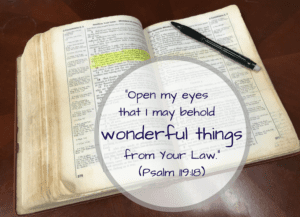
WONDERFUL THING IN THIS PASSAGE – Few mentally healthy people deny their need for forgiveness. You don’t have to believe the Bible to agree with its assessment that “all have sinned” (Rom 3:23) and that you are part of “all.”
The chief problem with sin is that it separates us from God and from all he wants for us. He doesn’t like that, not because he is hard but because he is loving – he wants only what is best for us. He created us to spend eternity with him enjoying all the blessings only an infinite God could provide.
He would prefer that we avoid all the harm and heartbreak of sin, and that is one of the reasons he wrote such a long instruction manual for life on earth, the Bible. “My little children, I am writing you these things so that you may not sin” (1 John 2:1a).
And he has arranged things so that we can, in fact, decide not to sin in any individual situation: “God is faithful; he will not allow you to be tempted beyond what you are able, but with the temptation he will also provide a way out so that you may be able to bear it” (1 Cor 10:13). It’s just that no one except Jesus has ever been able to not sin for very long at a time. So we’re back to all of us needing forgiveness.
The fact that forgiveness is readily available is its joy (see yesterday’s “Wonderful Thing”). The means by which God provides forgiveness is its beauty.
“But if anyone does sin, we have an advocate with the Father – Jesus Christ the righteous one. He himself is the atoning sacrifice for our sins, and not only for ours, but also for those of the whole world” (1 John 2:1b-2).
WONDERFUL THING IN OUR LIVES – If we can catch a vision of what Jesus has done to win our eternal forgiveness and what he continues to do for us every time we sin, it will change our lives. John would have us look at our Lord in these two ways:
See Jesus hanging on the cross as your substitute – Each of our sins is rebellion against God. Such rebellion carries the death penalty: “The wages of sin is death” (Rom 6:23). Jesus paid our penalty in the most horrible manner on the cross. He paid it in full. “He himself bore our sins in his body on the tree” (1 Pet 2:24). “For Christ also suffered for sins once for all, the righteous for the unrighteous, that he might bring you to God” (1 Pet 3:18).
See Jesus standing before the Father’s throne as your advocate – As we sin time and time again, Jesus “pleads our case before the father” (1 John 2:1 NLT). His argument in that heavenly court is not based on our merit (for we have none) but on his – He is “Jesus Christ the righteous one.” He alone has earned the right to make that case because he “has been tempted in every way as we are, yet without sin” (Heb 4:15).
When I behold my Master in those two ways, I am overcome with the beauty of forgiveness. I want to sin less and adore him more.
One more thing: When I see that he died not only for “our sins” (Christians’ sins), “but also for those of the whole world,” it makes me want to do what I can so that they hear about it.
